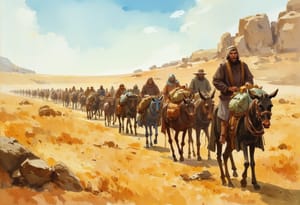| Series | Readings in Joshua |
|---|---|
| Theme | 2. Living in the land - Ola i le fanua |
| Colour | Lanu Pa‘epa‘e |
Scripture Focus: Iosua 9:3-21
But when the inhabitants of Gibeon heard what Joshua had done to Jericho and to Ai, they also resorted to a ruse, and went and made as if they had been ambassadors, and took old sacks on their donkeys, and wine skins, old and torn and bound up, and old and patched shoes on their feet, and wore old garments. All the bread of their provision was dry and moldy. They went to Joshua to the camp at Gilgal, and said to him, and to the men of Israel, “We have come from a far country. Now therefore make a covenant with us.” The men of Israel said to the Hivites, “What if you live among us. How could we make a covenant with you?” They said to Joshua, “We are your servants.” Joshua said to them, “Who are you? Where do you come from?” They said to him, “Your servants have come from a very far country because of the name of Yahweh your God; for we have heard of his fame, all that he did in Egypt, and all that he did to the two kings of the Amorites who were beyond the Jordan, to Sihon king of Heshbon and to Og king of Bashan, who was at Ashtaroth. Our elders and all the inhabitants of our country spoke to us, saying, ‘Take provision in your hand for the journey, and go to meet them, and tell them, “We are your servants. Now make a covenant with us.”’ This our bread we took hot for our provision out of our houses on the day we went out to go to you; but now, behold, it is dry, and has become moldy. These wine skins, which we filled, were new; and behold, they are torn. These our garments and our shoes have become old because of the very long journey.” The men sampled their provisions, and didn’t ask counsel from the mouth of Yahweh. Joshua made peace with them, and made a covenant with them, to let them live. The princes of the congregation swore to them. At the end of three days after they had made a covenant with them, they heard that they were their neighbors, and that they lived among them. The children of Israel traveled and came to their cities on the third day. Now their cities were Gibeon, Chephirah, Beeroth, and Kiriath Jearim. The children of Israel didn’t strike them, because the princes of the congregation had sworn to them by Yahweh, the God of Israel. All the congregation murmured against the princes. But all the princes said to all the congregation, “We have sworn to them by Yahweh, the God of Israel: now therefore we may not touch them. This we will do to them, and let them live; lest wrath be on us, because of the oath which we swore to them.” The princes said to them, “Let them live, so they became wood cutters and drawers of water for all the congregation, as the princes had spoken to them.”
- Joshua 9:3-21 (WEB)
Study:
This passage presents a fascinating episode from Israel's conquest of Canaan in which the inhabitants of Gibeon resort to a cunning deception to make a treaty with Joshua and the Israelites. Fearful of the power demonstrated by Israel in their victories over Jericho and Ai, the Gibeonites disguise themselves as travelers from a distant land, wearing old clothes and carrying moldy provisions to appear weary and distant. Their ruse succeeds because the Israelites fail to seek God's counsel before making the covenant. This leads to Israel honoring the oath despite discovering the deception, demonstrating the high value placed upon keeping promises made in God's name, even when made under false pretenses. It also highlights the importance of consulting God before major decisions, especially when dealing with potential threats or alliances.
Application:
Today, this story reminds us to prioritize seeking God's guidance in all our decisions to avoid being misled by appearances or deception. Just as Israel's leaders quickly accepted the covenant without divine consultation, we too can fall into the trap of relying solely on human judgment. The commitment to keep an oath made in God's name teaches us about the seriousness of our promises and our integrity before God and others. We are called to act wisely, depend on God's wisdom, and honor our commitments even when circumstances change. Additionally, it encourages us to be discerning in relationships and negotiations, ensuring our actions align with God's will and lead to peace.
Reflection Questions:
- How often do I seek God’s guidance before making important decisions?
- Have I ever been deceived by appearances or incomplete information? How did it affect me?
- What is the importance of keeping promises, especially those made in God’s name?
- How can I cultivate greater discernment in my personal and spiritual life?
- In what ways can I honor God by being truthful and prudent in my commitments?
Prayer:
Lord, grant me the wisdom to seek Your guidance in every step I take. Help me to discern truth from deception and to honor my commitments with integrity. May I always rely on Your counsel and walk in Your truth. Amen.
Tags: Joshua, Gibeonites, Bible study, deception, covenant, seeking God, wisdom, integrity, promises, discernment, faith, scripture reflection
